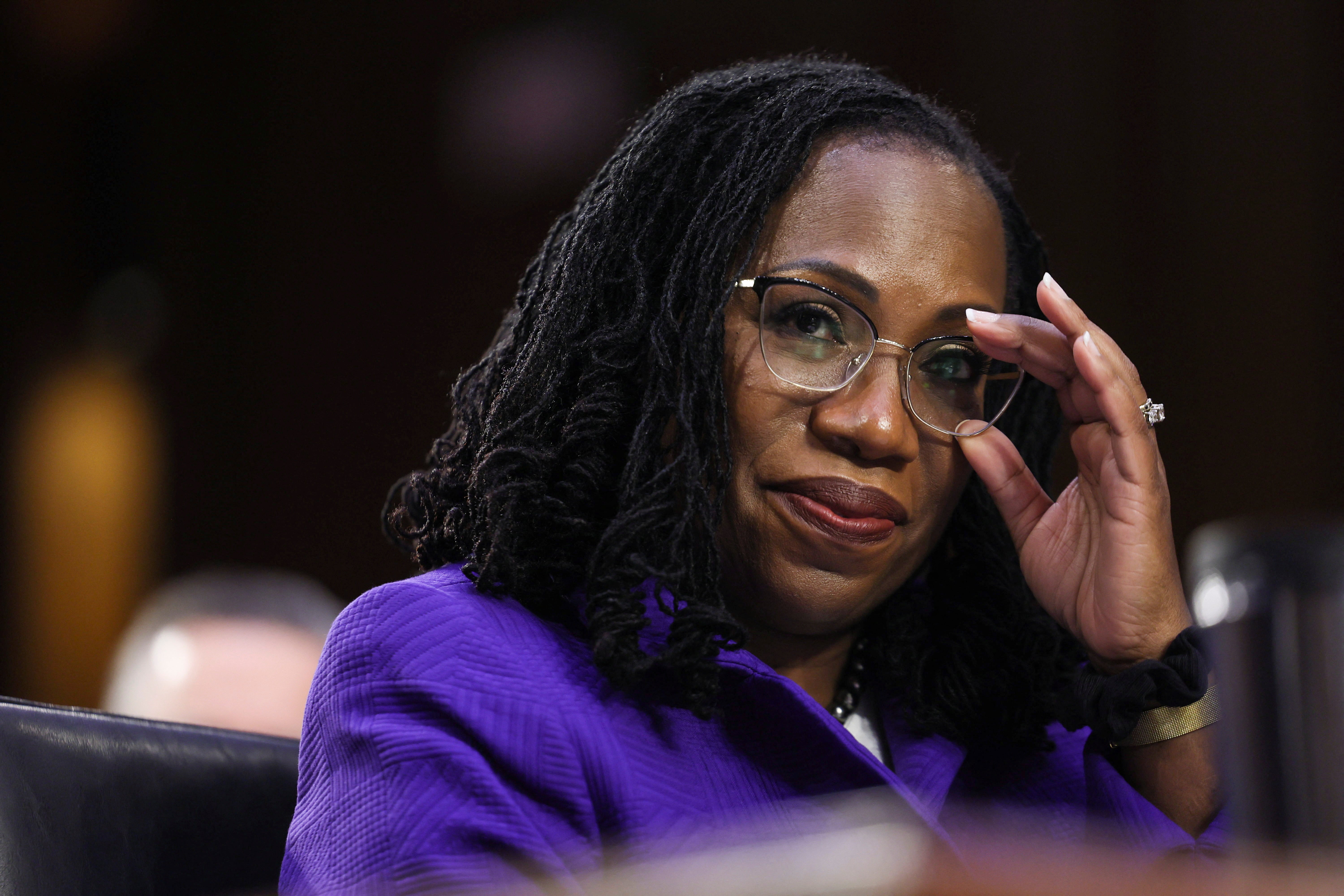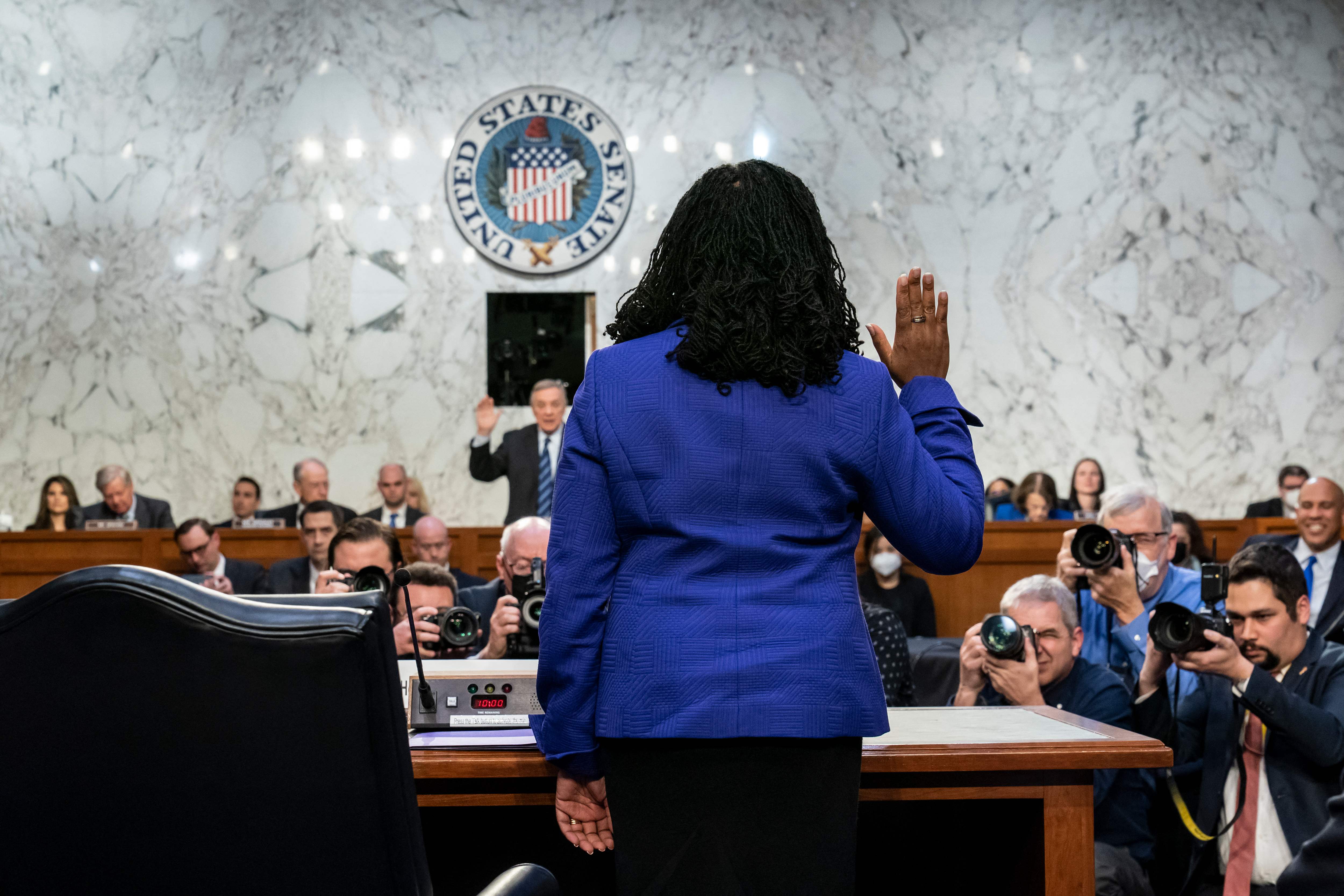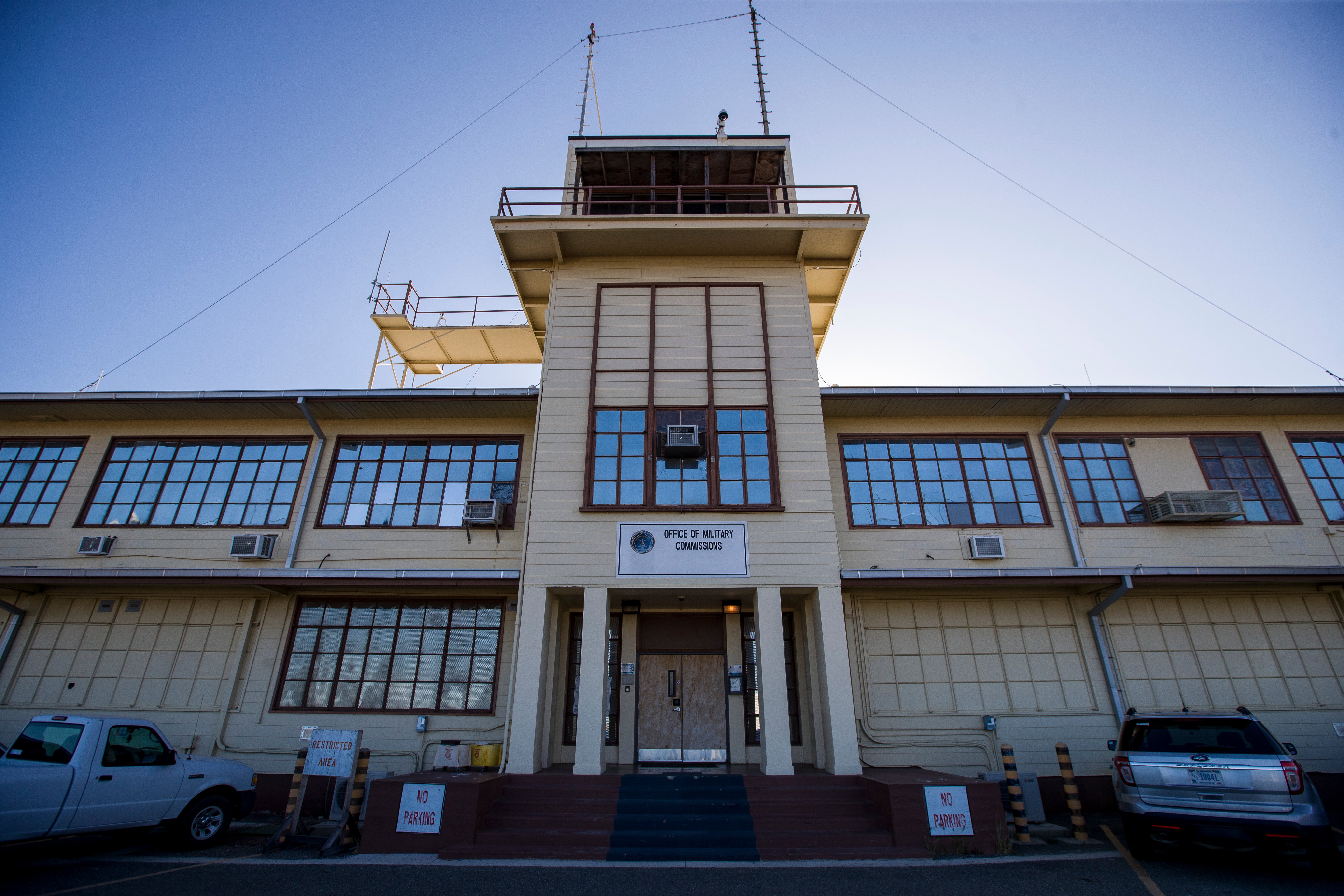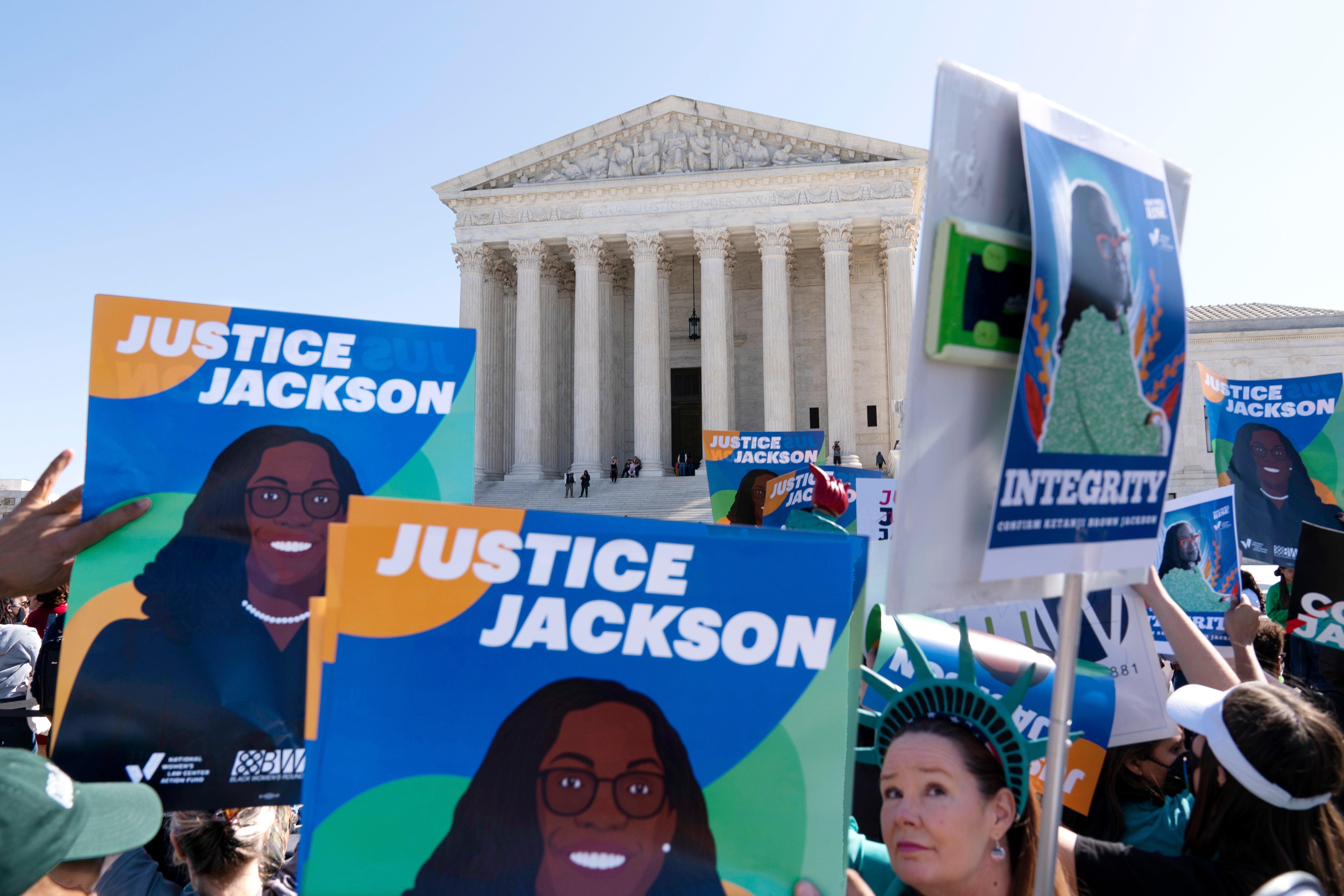Why Ketanji Brown Jackson’s public defence history matters
She represented some of the most vulnerable people in the criminal justice system. Her perspective is vital for safeguarding constitutional rights under threat, advocates tell Alex Woodward


Your support helps us to tell the story
From reproductive rights to climate change to Big Tech, The Independent is on the ground when the story is developing. Whether it's investigating the financials of Elon Musk's pro-Trump PAC or producing our latest documentary, 'The A Word', which shines a light on the American women fighting for reproductive rights, we know how important it is to parse out the facts from the messaging.
At such a critical moment in US history, we need reporters on the ground. Your donation allows us to keep sending journalists to speak to both sides of the story.
The Independent is trusted by Americans across the entire political spectrum. And unlike many other quality news outlets, we choose not to lock Americans out of our reporting and analysis with paywalls. We believe quality journalism should be available to everyone, paid for by those who can afford it.
Your support makes all the difference.Should she be confirmed as the 116th justice for the US Supreme Court, Ketanji Brown Jackson will be the first to have ever defended people in court who were too poor to pay for their defence.
Judge Jackson – who will be the first-ever Black woman on the high court, if confirmed – is also the first nominee with significant criminal defence experience since Thurgood Marshall, a powerful civil rights attorney whose legal arguments dismantled segregation and sought an end to legalised discrimination, work that had a lasting influence on his decision-making as the nation’s first Black Supreme Court justice.
“Her experience as a public defender brings with it the ability to look at how her clients experience the criminal justice system,” according to Arthur Ago, director of the Criminal Justice Project with the Lawyers’ Committee for Civil Rights Under Law.
“In addition to the facts of the individual cases, she is likely to be able to bring a human perspective of her clients that a lot of people in the law, especially people who don’t work in indigent defence – they don’t have that perspective,” he told The Independent.
Justice Marshall retired in 1991. In the three decades that followed, no one on the high court has had any experience representing some of the most vulnerable people in the criminal justice system, or experience handling the kinds of potentially life-or-death criminal cases that have come before the court.
That judicial perspective “has been uniquely missing from the court,” Mr Ago told The Independent. “There’s a big silence [on the court] from vulnerable people in this country that is not being represented.”
Ms Jackson’s nomination comes amid a wave of former federal public defenders selected for the judiciary under the Biden administration, following calls from civil rights advocates urging the president to look beyond the pool of prosecutors and corporate lawyers promoted by special interest groups to fill the federal judiciary.
National Urban League president Marc Morial said Judge Jackson’s career reflects her dedication “to fighting for the most vulnerable members of our society” and “for the constitutional rights of all – qualities that have been overlooked in recent nominations to the court.”
Only 1 per cent of federal appellate judges spent their careers in public defence or as legal aid attorneys, according to the Center for American Progress, and only 8 per cent of all federal judges are former public defenders.
Former president Donald Trump appointed 10 times as many prosecutors as criminal defence attorneys and public defenders to the federal judiciary, according to the Cato Institute.
House Democratic caucus chair Hakeem Jeffries said “her time as a public defender, on the US Sentencing Commission and as a federal judge, combined with her life experience as a Black woman, has provided her with unique knowledge and perspective to strengthen the high court and balance the scales of justice.”

The landmark 1963 Supreme Court decision in Gideon v Wainwright effectively enshrined the right of counsel for criminal defendants. Four days after the 59th anniversary of that decision, Judge Jackson sat for the first day of confirmation hearings following her nomination to the court.
From 2005 to 2007, she served as an assistant federal public defender handling cases before the US Court of Appeals for the DC Circuit, a court she joined as a judge in 2021.
From that relatively brief window of her career, and her tenure on a commission tasked with reducing disparities in federal prison sentences, Judge Jackson knows not only how federal prosecutors work to secure stiff penalties but can also articulate the perspective of the person accused of a crime, and the systemic problems of navigating the criminal justice system that got them there – particularly if that person is poor and Black.
“Knowing what the law is and knowing what the law requires in certain procedures is one thing,” Mr Ago told The Independent. “Knowing what actually happens on the ground … is a completely different thing that has not been represented in the court.”
Her experience could inform the kinds of questions she will ask, or the issues on which she will focus during oral arguments and during closed-door conferences with other justices.
“It’s not that she’s bringing a public defender bias, but that [a] public defender perspective would allow her to illuminate these cases in ways that other justices might not see, simply because they haven’t had those experiences, or those types of clients,” according to Mr Ago. “Those real-world experiences will certainly inform the few questions she’ll be allowed to ask … that wouldn’t occur to other justices to ask.”
In 2007, Ms Jackson convinced a three-judge panel to vacate a conviction of a client who was accused of illegal possession of a gun as a felon after police found a firearm inside his home. She successfully argued that the trial judge in the case obfuscated jury questions in a way to avoid asking them whether they had relatives who were police officers, violating her client’s Six Amendment right to an impartial jury.
She also was appointed to defend Khi Ali Gul, a man considered an “enemy combatant” by the US government, and advocated for his right to fight for his release from Guantanamo Bay, Cuba.
In 2005, she argued that he lacked the ability to “vindicate his rights under domestic and international law” without being charged with a crime, appearing before a military tribune, or having access to counsel despite constitutional provisions, while being confined to his cell for up to 23 hours.
His rights to “freedom from torture” and from “cruel, inhuman, and degrading treatment” amounted to physical and psychological abuse, she wrote.
The case was consolidated with those of other detainees, and he was sent back to Afghanistan in 2015 following a 2009 executive order from then-President Barack Obama ordering a review of such cases.
After her service as a public defender, Ms Jackson, then in private practice, joined amicus briefs to the Supreme Court for two cases involving US detention at Guantanamo.

Her experiences working on behalf of currently and formerly incarcerated people – a population in the US that is disproportionately poor and Black – can provide the court with a much-needed perspective on law enforcement interaction from a defendant’s perspective, one that is rarely if ever reflected in the court, civil rights groups argue.
That perspective also is shaped by the incarceration of a family member.
While working as a public defender, her uncle was serving a life sentence in Florida for a nonviolent drug offence, a conviction that was later commuted by then-President Obama.
Like Justice Stephen Breyer, whose retirement has opened a path for his once former clerk to join the bench, Judge Jackson also served on the US Sentencing Commission, a bipartisan agency directed by Congress to address sentencing disparities.
During her tenure as vice chair, the agency moved to dramatically reduce severe federal prison sentences for drug offenders in a ruling to make the Fair Sentencing Act retroactive.
Two of Judge Jackson’s uncles and her brother have also served in law enforcement.
Sam Spital, director of litigation with the NAACP’s Legal Defense Fund, said her record “illustrates a recognition of the unique barriers to justice still experienced by too many people in this nation.”
“Judge Jackson’s nomination is a step toward a future where our justice system is informed by people from a variety of backgrounds and perspectives – a critical aspect of ensuring the legitimacy of the court at a time when its role in defending constitutional rights is increasingly consequential,” he said in a statement.
LDF policy director Lisa Cylar Barrett said her experience presents “a promising picture of the unique and critical perspective she would bring to a court charged with safeguarding the constitutional rights of a multi-racial, multi-ethnic nation of people.”
The Legal Defense Fund – an organisation founded by Thurgood Marshall – reviewed 500 of Judge Jackson’s written opinions and orders, non-judicial writings, speeches and papers, determining that her experience as a public defender “recognizes the humanity of incarcerated people.”
During confirmation hearings for the appellate court in 2021, Republican Senator Ben Sasse asked whether she believed her defence “would result in more violent criminals – including gun criminals – being put back on the streets”.
Judge Jackson replied that defendants must have “competent legal counsel to hold the government accountable for providing a fair process and otherwise assist in the preparation of a defense against the charges.”
Public defenders “perform this crucial function,” she said.
“I lacked a practical understanding of the actual workings of the federal criminal justice system, and I decided that serving ‘in the trenches,’ so to speak, would be helpful,” she wrote to the Senate Judiciary Committee last year.
“The government cannot deprive people who are subject to its authority of their liberty without meeting its burden of proving its criminal charges,” she wrote. “Every person who is accused of criminal conduct by the government, regardless of wealth and despite the nature of the accusations, is entitled to the assistance of counsel.”

Judge Jackson’s appointment also subverts a right-wing judicial pipeline, one in which corporate attorneys and prosecutors promoted by special interest groups have vastly outnumbered the number of civil rights lawyers and public defenders on the federal bunch.
Former President Donald Trump nominated three justices to the high court, shifting the ideological balance to a conservative majority.
With the exception of liberal justices Elena Kagan and Sonia Sotomayor, as well as retiring justice Stephen Breyer, the nation’s high court is made up of members of the Federal Society, a politically powerful organisation that has ushered judicial nominees to Republican presidencies.
Senate Minority Leader Mitch McConnell – an architect of conservative appointments to the federal judiciary – previously criticised Judge Jackson for her support from “fringe groups” that are “spending dark money to raise her profile,” referencing progressive group Demand Justice.
Democratic Senator Sheldon Whitehouse said that “the present court is the court that dark money built.”
“Anonymous donations funded the Federalist Society while it housed the selection turnstile run by the dark-money donors,” he said during opening remarks at the Senate Judiciary Committee’s hearings on 21 March. “Anonymous money funded the dark-money group down the same hallway as the Federalist Society that ran dark-money political campaigns for the selected justices. And because of secrecy, Americans are denied any real understanding of the overlap of all that dark money with the political dark money funding the Republican Party.”
Judge Jackson’s nomination stands “in sharp contrast” to the current court’s legacy, he said.


Join our commenting forum
Join thought-provoking conversations, follow other Independent readers and see their replies
Comments